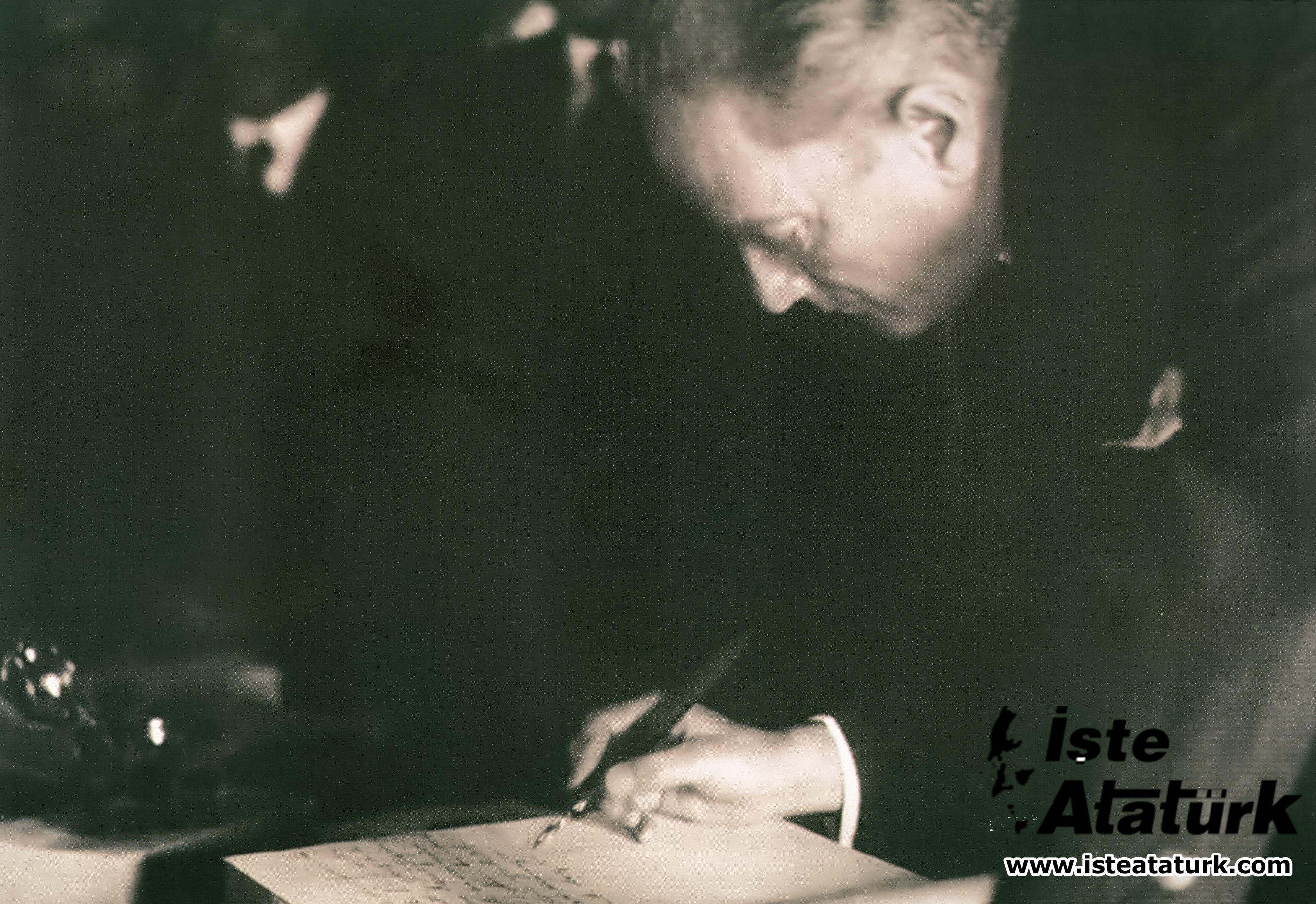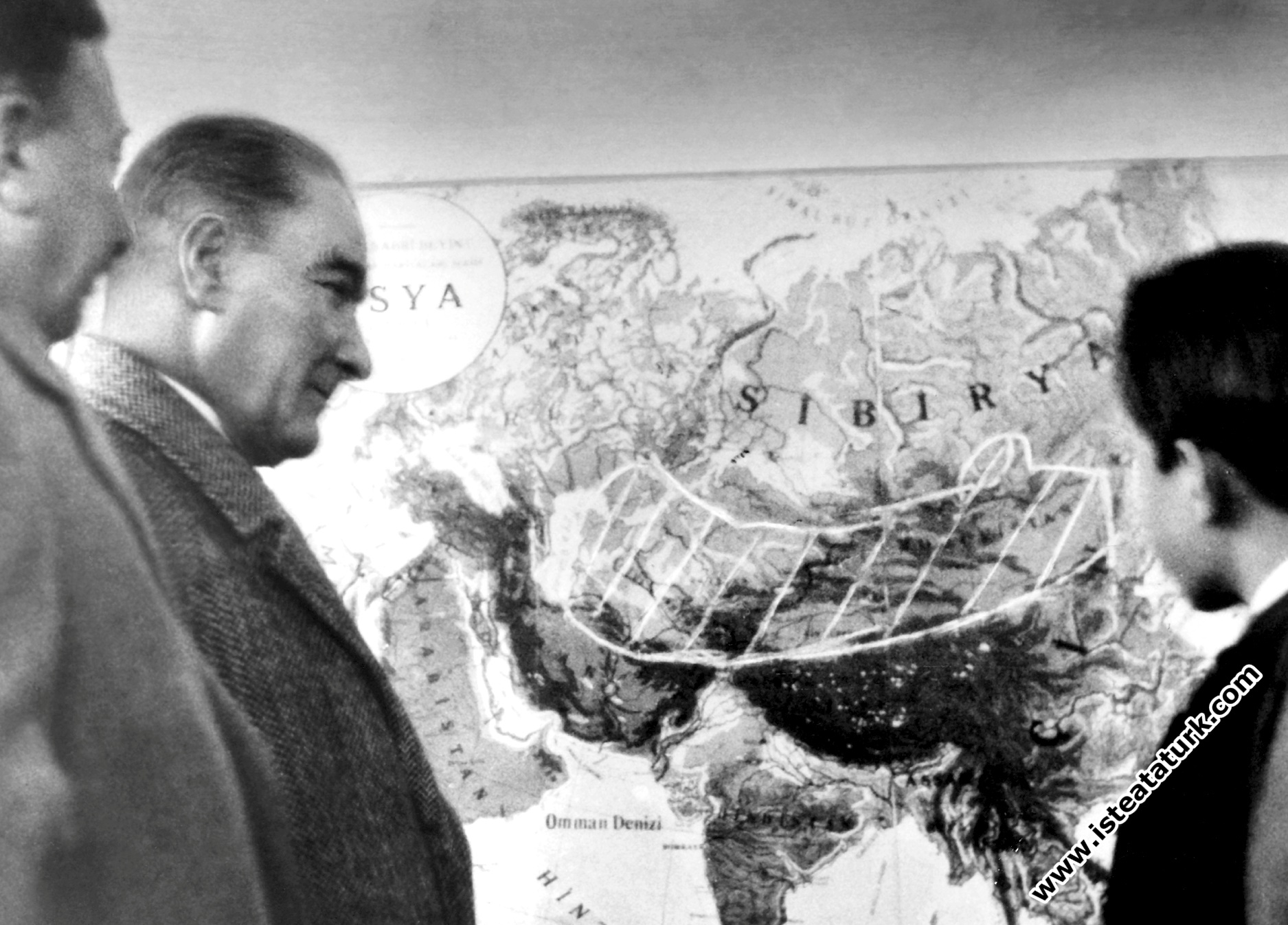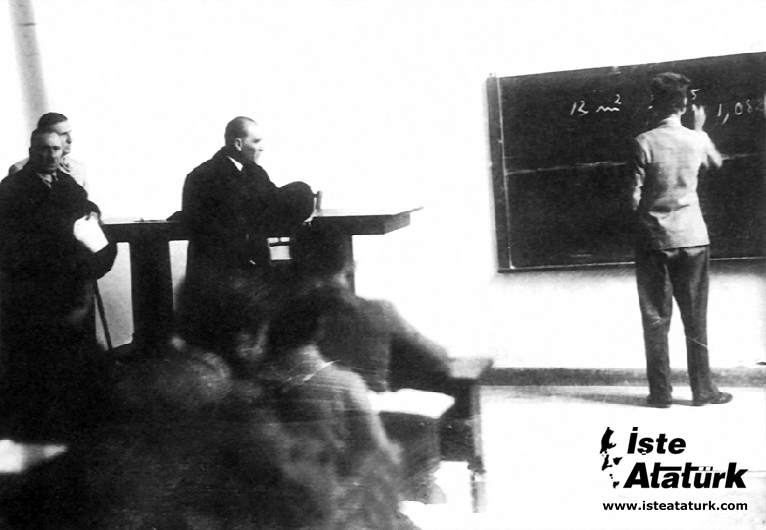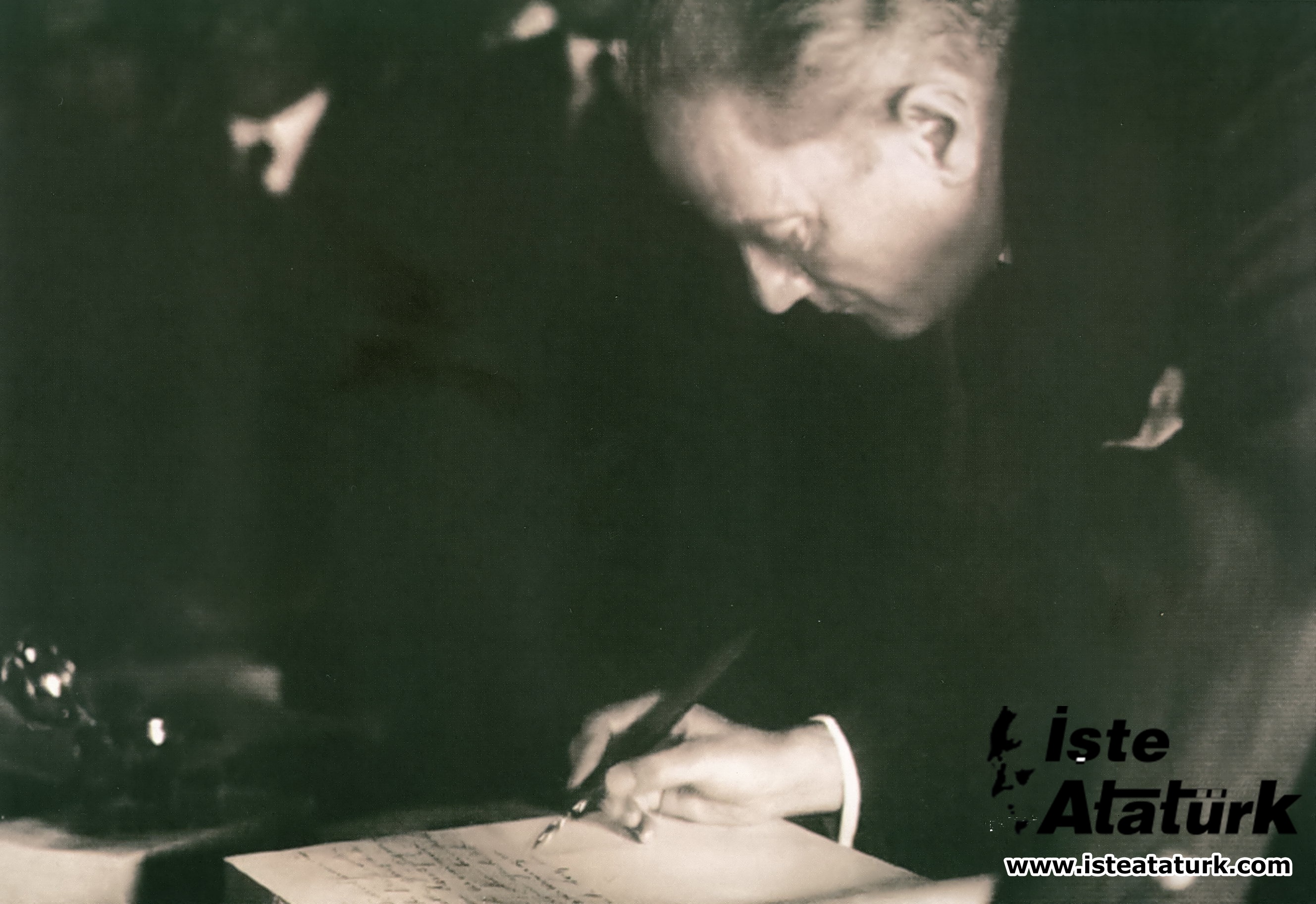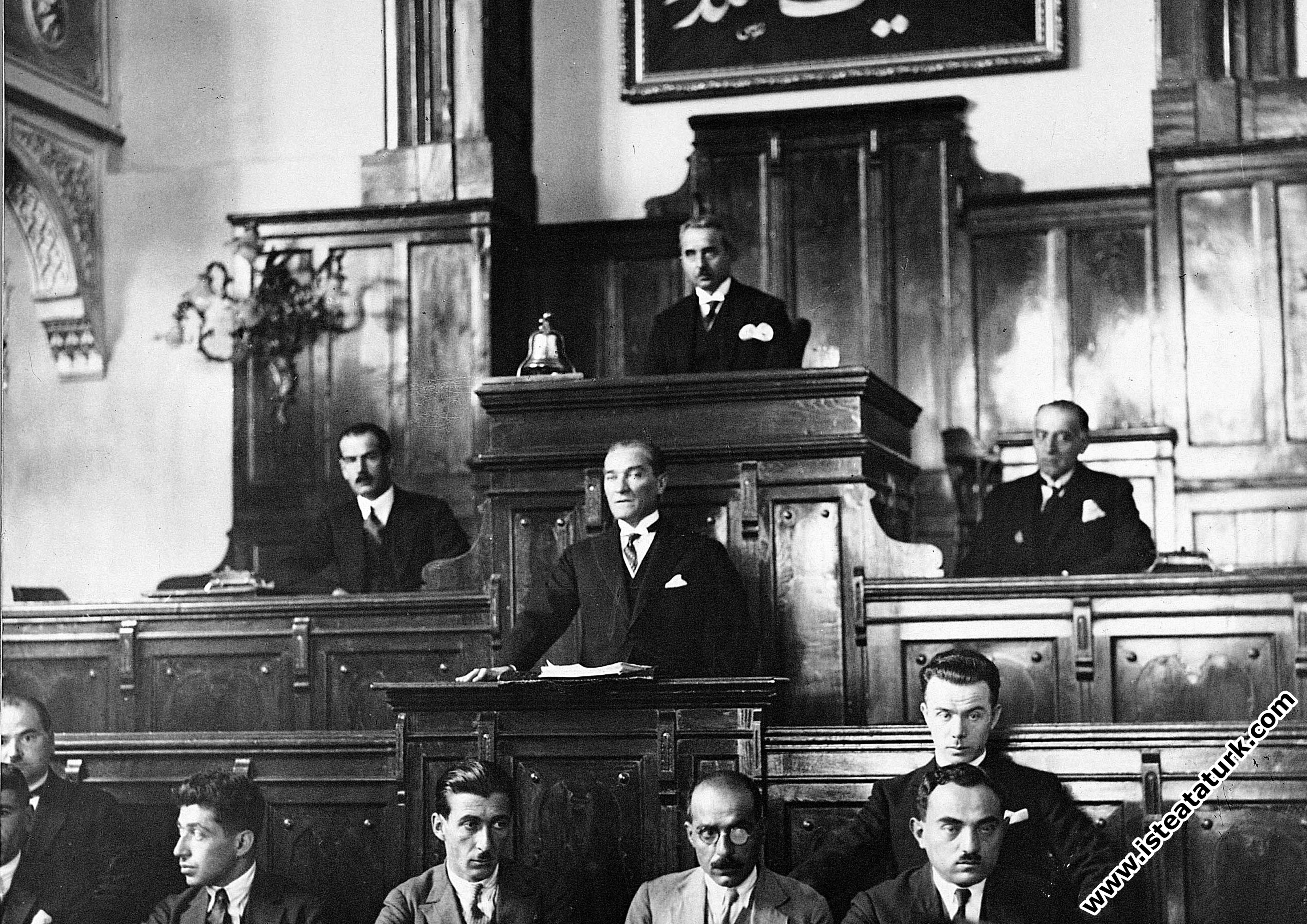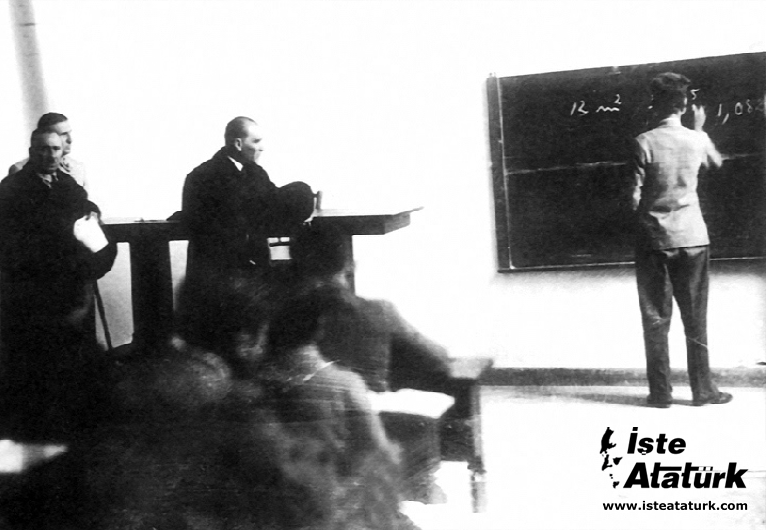
Republic and Atatürk's Revolutions
Character Size
“A devastated country on the edge of the abyss... Bloody struggles with various enemies... Years of war.... After that, the new society, the new state, recognized with respect both inside and outside, and incessant revolutions to achieve them!... Here, the Turkish general A brief expression of the revolution...” Mustafa Kemal Atatürk
REPUBLIC AND ATATÜRK REVOLUTIONS
A- Republicanism
The word republic has come to our language from the Arabic word republic. People; As a word, it means the people, the people, the great crowd. It is also used to express a tribe or nation in a collective state.
The word "Republic" is in the Turkish dictionary of TDK;
While the sovereignty of the nation is given as the form of the state that it holds in its own hands and uses through deputies elected for certain periods.”1;
In the MEB Sample Turkish Dictionary;
“The state under the administration of an elected president. The form of state based on the domination of the people.”2
We see that the word republic is given in almost the same and similar forms in terms of meaning.
As a political regime, a republic refers to a form of state that derives its power from the people. Therefore, it is a system in which power belongs to the nation.3
For this reason, sovereignty in the republic belongs not to a single person or group, but to all segments of society. In this sense, it adopts a government model in which the people working in the main organs of the state, especially the head of state, are elected, and in particular, the inheritance system does not play a role in determining these. In western languages, it is republic ( public = self-governing). It is the equivalent of the word democracy in the same sense. But as a term, it is not synonymous with democracy in practice. In this respect, it has nothing to do with democracy. Because democracy is a valid system in monarchies as well as republics. England, Sweden, Netherlands (stand-alone governments).
As in Belgium, Japan etc. A republic can be a democracy. In this case, it depends on the public administration, national will, free elections, the existence of various parties, and the non-interference of officers and judges in politics (USA, Germany, France, etc.).
The general republic can be communist. In this case, there is only one party dominance. But none of the freedoms of democracy exist. Elections are arbitrary. There is no public administration and the will of the people. The general republic can also be fascist. In this case, it is against communism. But all freedoms are either absent or limited. There must be dictatorship.
B- Democracy
Again, let's try to explain this concept with its dictionary meanings: In TDK Turkish Dictionary;
Democracy: Fr.democracy, Greek (demos- people, kratos- power). A form of government based on popular sovereignty4.
In the MEB Sample Turkish Dictionary; Democracy: A form of government based on national will, free elections, will of the people 5.
Let's take a few opinions on the concept of democracy from writers and scientists: Prof.Dr. Ali Fuat BAŞGİL, in his work “On the Road to Democracy” (p.85);
“Democracy, above all, relies on and relies on the will power and character training of the citizens.”
Prof. dr. İ.KAFESOĞLU, in his work titled “The Issues of Turkish Nationalism”, states: “Communities who have had their share of the peaceful atmosphere of a superior democracy have grasped the true meaning of justice and equality and have succeeded in determining the dose of meaning in the social order.”
prof. Dr. Mehmet KAPLAN “Democracy, that is, the secret vote is a force that moves the people.”
The poet and writer Y.Ziya ORTAÇ gives a somewhat humorous description; “Democracy is the entry of the street into politics. That's why polite politicians who don't always take the pulse of the pavement with two fingers have only one chance: to lick their palms!”
True democracy, despite some of its flaws, is the best form of government that humanity could find in its 6,000-year history, the most suitable for human dignity and interest.
Prof.Dr.Afet İnan, “M. In his work titled “What I Wrote from Kemal Atatürk”;
He states the most prominent features of the principles of democracy as follows:
“1- Democracy is essentially political. Democracy as we know it is political. Its goal is to ensure political freedom through the nation's oversight over the rulers.
2- Democracy is a matter of the mind. The principle of government also requires a love of justice and an idea of morality. Democracy is the love of the country.
3- Democracy is essentially individual. This feature is the citizen's participation in the sovereignty as a human being.
4- The ultimate democracy is equality. This feature is a necessary consequence of the individual feature of democracy” (p.71-72).
He also divides the views against democracy into three;
1. Bolshevik theory
2. Revolutionary political syndicalism
3. The theory of representation of interests6
Democracy is a regime based on people listening to each other.
Democracy is a regime of tolerance.
Democracy is a regime of polyphony, making the person and society happy.
Democracy is not a regime of acting according to the interests of a class and individuals, but a regime of respecting each other and enjoying the happiness of living together.
C- Republic in Turkey
The Republic was basically founded on the idea of national sovereignty. The republic in Turkey is closely related to the thoughts of its founder, Atatürk. Because he has always sincerely wanted the establishment of a republican regime that complies with the principles of democracy in Turkey. Therefore, it is possible to say that the studies on this subject were carried out completely in line with his directives.
For this reason, in order to understand the issue of bringing the republic to Turkey well, it is necessary to reveal the relationship between Atatürk's thoughts on this subject and the complementary concepts of Atatürk and the republic. Now, we will try to improve our conference topic by addressing these issues:
a) The Relationship Between Atatürk and the Concept of the Republic
Atatürk and the republic are two concepts that complement and define each other.
In order to understand Atatürk, and in order to understand Atatürk, it is necessary to get to know the republic, starting from solid and solid foundations. Because the Republic is a form of administration in which Atatürk shaped his hopes and desires for the protection of the Turkish national existence and the attainment of prosperity and happiness.
Atatürk is a statesman who has embraced the idea of a republic since his youth. In 1902, while he was still in the 1st year of the War Academy, in a speech he gave with his teacher Osman Nizami Pasha on the Ottoman Empire, he talked about the administration in the Western sense and expressed the word of the revolution. Again in 1905, before he went to Damascus for internship, in a meeting he held with his friends; While explaining his idea by saying, “This case is to establish a Turkish state before an empire that is about to collapse.”7, he also stated that it is to establish a new state order.
Therefore, since his youth, Atatürk was a person who knew what kind of a regime the republic was and required his nation to attain such a will. Even in these years, he did not hesitate to say that the Turkish nation would certainly attain a republican administration.
He took the first concrete step towards the attainment of the republican regime of the Turkish Nation, which is his biggest dream, during the Erzurum Congress and to his aide Mazhar Müfit KANSU; He said that after the victory, the form of government would be the Republic. However, Atatürk was a person who did the things he planned to do when the time came and the conditions were met.
According to Atatürk, the Republic;
It is an administration based on moral virtue. Republic is virtue. Since virtuous and honorable people are raised in the republican administration, it is the most suitable administration for the character and customs of the Turkish nation. He sees the republic as a people's government based on national sovereignty. It adopts it as a form of government that best regulates the rights and duties of the citizen against the state and the state against the citizen.
b) Benefits of the Republic
The republic in Turkey is the result of great struggles that Atatürk kept a secret in his heart for years, for which he was ready to sacrifice his whole life.
While the cabinet system was adopted with the proclamation of the republic in Turkey, at the same time a great step was taken towards the democratization of the state and prepared the ground for the reforms to be made.
republic in Turkey; It is a political regime that all citizens share and benefit from, regardless of race, religion, language and gender. The essence of this regime is the principle of equality.
The Republic, as the most developed and most advanced form of state, is both the product and the success of the Turkish revolution. Therefore, as the result of a great struggle and the beginning of a new era, it is a value that should be understood and protected by all members of the Turkish Nation.
D- Basic Principles and Unchangeable Characteristics of the Republic in Turkey
1) Basic Principles of the Republic
In addition to the various principles that have given power to the Republic of Turkey since its establishment and are referred to as Atatürk's principles and reforms, there have always been two basic principles on which it is based. These;
“It is a democratic form of government and a scientific mindset within its conditions. In this framework, all institutions and organizations of the republic, on the one hand, sovereignty unconditionally belong to the nation, on the other hand, the most true guide in life is science. Republic shaped according to its principle; It has risen on the awareness that the essences of democratic management and scientific way of thinking are the same”.
In addition, freedom (freedom) and full independence in every field are among the unchangeable principles of the republic and the basic concepts it has brought to the Turkish nation. The disappearance or emptying of one of these concepts means that there is no real mention of the existence of a republic.
The founder and first President of the Republic of Turkey, Atatürk, based the Republic of Turkey on such solid principles that; These principles are capable of consistently and sincerely meeting the national and international requirements of the democratic social order that all civilized humanity has longed for.
These principles are in a structure that can ensure the achievement of human rights and freedoms, which have become one of the foremost aspirations of today's humanity, and their use in accordance with a just peace between nations, with the developments provided in every field due to the encouragement of contemporary science and technology, whose effectiveness is constantly increasing, and its openness to new inventions. .
2) Immutable Characteristics of the Republic
The State of the Republic of Turkey, as expressed in the Constitution, has immutable characteristics such as being a democratic, secular and social state of law.
The Republic of Turkey, which has identified with these qualities, has developed in a short time. However, the Republic, which is not satisfied with a short-term development and change, has always been in search of making it permanent. Although it has made progress in various fields since its establishment, it has not found it fully sufficient and today it has been in great quests in order to ensure that its people lead a contemporary and modern life.
At this point, the unchangeable characteristics of the republic, in particular, are the guarantee of the development of the state and the desire of the people to live in a modern and modern way. These:
1- Being democratic
2- Being secular
3- Being a Social State
It is a state model that embraces the people, works to solve their problems, and aims to secure the lives of all its citizens in every field, both socially and individually.
In this sense, the state of the Republic of Turkey has tried to provide all kinds of services to them, depending on this quality, since its establishment.
4- Being a State of Law
The Republic of Turkey is also a state of law. In the reforms carried out in the Republican period, secularism was adopted in the field of law and the rules arranged in accordance with religious understanding were abolished; Instead, rules based on reason, logic and science were accepted.
In the Republic of Turkey, the principle of rule of law has been adopted and the principle that everyone is equal before the law has been accepted as one of the unchangeable characteristics of the law. In addition, pressure on judges has been prevented in order to ensure that justice is served.
After the introduction of the republic to Turkey, the developments achieved with the Republic in Turkey, and the various features of the Republic of Turkey, it was understood what kind of a regime and what a great value the Republic was. Therefore, all members of the Turkish Nation must embrace and protect this value, at which point the principle of republicanism emerges.
E- Nationalism
The nation, as the most developed social order, refers to a real order that was formed by going through historical stages within the human family.
A nation is a group of people who have the same history and desire to live together.
This basis, which is gathered around, may vary according to the characteristics of human societies. For example; It consists of the concepts of culture in France, race in Germany, language in Arabs, and nationality in the USA.
Atatürk defines the nation as follows: "It is a political and social society composed of citizens connected to each other by the unity of language, culture and ideal."
Nationalism, on the other hand, is a concept that constitutes the basis of the sense of belonging or the feeling of nation that the members of a nation feel towards the nation they belong to, as an idea movement based on the reality of the nation and one of the most valid social policy principles of our age.
Turkish nationalism also has some unique features. For example; The basis of Turkish nationalism is the national character. Moreover, Turkish nationalism is neither religious nor socialist. Because there is the concept of nationality, it is a belief and a feeling. In that belief and feeling, the indivisible integrity of the homeland is essential.
Atatürk's nationalism is based on these values. In addition, in Atatürk's understanding of nationalism, the nation is fundamental. In Atatürk's nationalism, especially the love for the past of the Turkish nation and its unity and solidarity are given place and value.
Atatürk's nationalism values freedom and human personality and is based on the idea of equality.
Ataturk's nationalism is progressive. In accordance with the realities of the age, it is based on the truths of reason and science. In this framework, it foresees the scientific service of the Turkish nation to the world civilization.
F- Populism
Populism has three important elements:
a) People's administration. (political and democratic)
b) Equality.
c) Not to accept the class struggle.
G- Statism
It is the increase and expansion of state powers, the spread of public services and activities.
Ğ- Secularism
As a word, it means non-spiritual person, non-religious thing, idea, institution, principle.
Laicism is; expresses the understanding of law that is not subject to religious rules in social life. However, secularism in the real sense; It is the separation of religion and state affairs and the state's neutrality in the realization of the affairs of conscience.
Secularism entered the field of positive law with the republic in Turkey, as in Western countries.
According to Atatürk, religion is a matter of conscience. Everyone is free to obey the orders of conscience. Respect for religion is the result of respect for the rights of the believer.
H- Revolutionism (Revolutionism)
No matter how big the meanings of the concepts get, no matter how wide they are, it has a great relationship with the dictionary meaning of the word from which it is derived etymologically.
revolution; It comes from the Arabic word heart and is defined as the radical change of institutions in the political, social and military fields of a nation by the state with reasonable and measured methods.
Revolution, in the broad meaning of the Turkish legal dictionary; parallels the sentences above.
Revolutionism is; is to adopt an idea that aims to prepare opportunities for new progress and developments in modern social life with a founder and constructive thought.
Revolutionism, on the one hand, foresees new revolutions as a requirement of civilization, on the other hand, it finds it necessary to move forward.
Atatürk also used the word revolution frequently, especially drawing attention to the difference from the word revolution. He says the following about it:
“What is the Turkish revolution? This revolution, apart from the meaning of revolution implied at first glance, expresses a wider change than it”.
Again, Atatürk expressed the Turkish revolution with these laconic words:
“A devastated country on the edge of the abyss... Bloody struggles with various enemies... Years of war... After that, the new society, the new state, which is recognized with respect at home and abroad, and incessant revolutions to achieve them!... Here, the Turkish general a brief expression of his revolution…”
In order for a revolution to occur, certain conditions must come together. These:
1- Administrative, social and economic ones faced by the society.
2- The development of intellectual life and the giving of works that prepare the revolution.
3- Leader and staff formation.
4- Organization, discipline, plan and program.
Today, there are different opinions on the concepts of the Turkish Revolution or the Turkish Revolution and Atatürk's reforms or Atatürk's revolutions:
It varies according to the definition of revolution or revolution. Some use the concept of revolution as a "development for the better" in return for the French Evolution; Others, on the other hand, take the meaning of Revolution as a radical change, a continuous development, including the revolution.
It is possible to examine the revolutions (revolutions) in Atatürk's revolution in two parts:
1- The period of National Struggle and National Liberation, which ended with a great victory and came to the Republic.
2- Political, social, cultural and economic revolutions that started with the Republic.
When Atatürk's revolutions or Atatürk's Revolutions are mentioned, it is understood that the revolutions made under the leadership of Atatürk, especially the establishment of the Republic, are also called the Turkish Revolution.
Ataturk's revolutions or the Turkish revolution are also called Kemalism or Kemalism. There is no doubt that there is a Kemalism fact, which is the basis of our leap into an advanced cultural age, in terms of thought and action - taken as an example by oppressed nations. In the middle, there are the revolutions and the main principles adopted by the Great Ancestor, whose target, path and guide are indicated, which are characterized by the words we are like us.
Atatürk states the purpose of his reforms as follows:
“To bring the people of the Republic of Turkey into a completely modern and civilized society in all its meanings and forms. This is the main principle of our revolution”.
In his speech in Dumlupınar on 30 August 1924;
“Our nation's goal, our nation's ideal, is to be a fully civilized human community all over the world... Walking on the path of civilization is a condition of life on the path to success.
Those who pause on this road or who show their ignorance and inattention to look back rather than forward on this road are doomed to drown under the ebullient flood of general civilization.
He sometimes uses the phrase "nationalist" and defines Turkish nationalism as follows:
“Turkish nationalism is to preserve the special characteristics of the Turkish nation and its own independent character, while walking parallel to and in harmony with all contemporary nations in the path of progress and development and in international relations.”
Atatürk foresees humane behavior and the happiness of humanity, not selfishness in nationalism. It is seen that national culture and modernization are essential in the understanding of Turkish nationalism or Atatürk nationalism, and there is no difference between the purpose of revolutions and the purpose of Turkish nationalism.
I- Ataturk's Revolutions
It is possible to collect the reforms made in this period in five groups, and we can give them together with their sub-steps as follows:
A) Revolutions made in the political field (Revolutions):
1- The abolition of the sultanate. ( 1 November 1922)
2- Proclamation of the Republic. (25 October 1923)
3- Abolition of the caliphate. (March 3, 1924)
4- Constitutional movements in the new Turkish state:
a) Constitutional laws enacted before the adoption of the first constitution.
b) Constitution of 20 January 1921. (Teşkilât-ı Esasiye)
c) Constitution of 20 April 1924. (Second constitution)
5- Multi-party regime trials and results.
B) Revolutions made in the field of law:
1- Adoption of the civil law. (February 17, 1926 – October 6, 1926)
2- Adoption of the penal code. (March 1, 1926)
3- Adoption of the law of judges. (March 3, 1926)
4- Adoption of the commercial law. (29 May 1926)
5- Adoption of the Code of Obligations. (May 8, 1928)
6- Adoption of the enforcement and bankruptcy law. (24 April 1929)
C) Revolutions made in the field of education and culture:
1- Revolutions made in the field of education:
a) Combining education and training
b) Adoption of Latin letters. (November 1, 1928)
c) University reform. (31 May 1933)
2- Revolutions made in the field of culture:
a) Studies in the field of Turkish history. (April 15, 1931)
b) Studies in the field of Turkish language. (12 ... 1932)
D) Revolutions made in the social field:
1- Change in attire.
2- Closure of dervish lodges, zawiyas and tombs.
3- Changes in calendar, clock, measurements and figures.
4- Adoption of surname law. (June 21, 1934)
5- Determination of national holidays and holidays.
6- Acceptance of women's rights. (December 5, 1934)
E) Revolutions made in the field of economy and health .
1- Studies in the economic field.
2- Studies in the field of health.
Conclusion
It is the basic principle of the Turkish revolution (revolution) to establish a national, democratic, rational and secular, in a word, western, world view in the country and to reorganize all the institutions of the state with this view.
Kemal Atatürk is the leader of this nationally progressive movement, which was made not only to save the nation, but also to provide it with the opportunity to live eternally and freely, and to develop its intellectual and spiritual abilities to the fullest extent.
Indeed, Ataturk's revolutions are, first of all, a part of a great historical and social movement that is taking place in our time. In other words, modernization is to take modern culture based on modern civilization, which finds its succinct expression in the west.
Considering that Atatürk left our independence and our republic as the greatest trust; it is possible to accept all of them as the basis to be based on protecting, protecting and glorifying the Republic of Turkey.
It is possible to understand why Atatürk entrusted the independence and the republic to the youth by stating the following statements at the beginning of his Address to the Youth. Namely;
He begins his speech with the words, "The result we have reached today is the result of the vigilance created by the national disasters suffered for centuries, and the price of the blood that has irrigated every corner of this holy homeland, and I entrust this result to the Turkish youth."
It should not be forgotten that; The main purpose of education is to bring about behavioral change in the person.
Modern education, on the other hand, preserves the past, lives in the present, secures and evaluates the future; Atatürk's revolutions with the concept of republic and democracy find value in this sense, with the aim of making the generation to be raised with identity, personality and self-confidence.
1 Turkish Dictionary, TDK Publication, Ankara 1988. p. 263.
Turkish Dictionary with 2 Examples, MEB Publication, Ankara 1995. p. 468.
3 Refik TURAN and Others, Ataturk's Principles and History of Revolution, Siyasal Publishing House, Ankara 1999. p. 290.
Dr. Hayrettin Parlakyıldız*
*Çanakkale Onsekiz Mart University Faculty of Education
Source: ATATÜRK ARAŞTIRMA MERKEZİ DERGİSİ, Sayı 55, Cilt: XIX, Mart 2003
